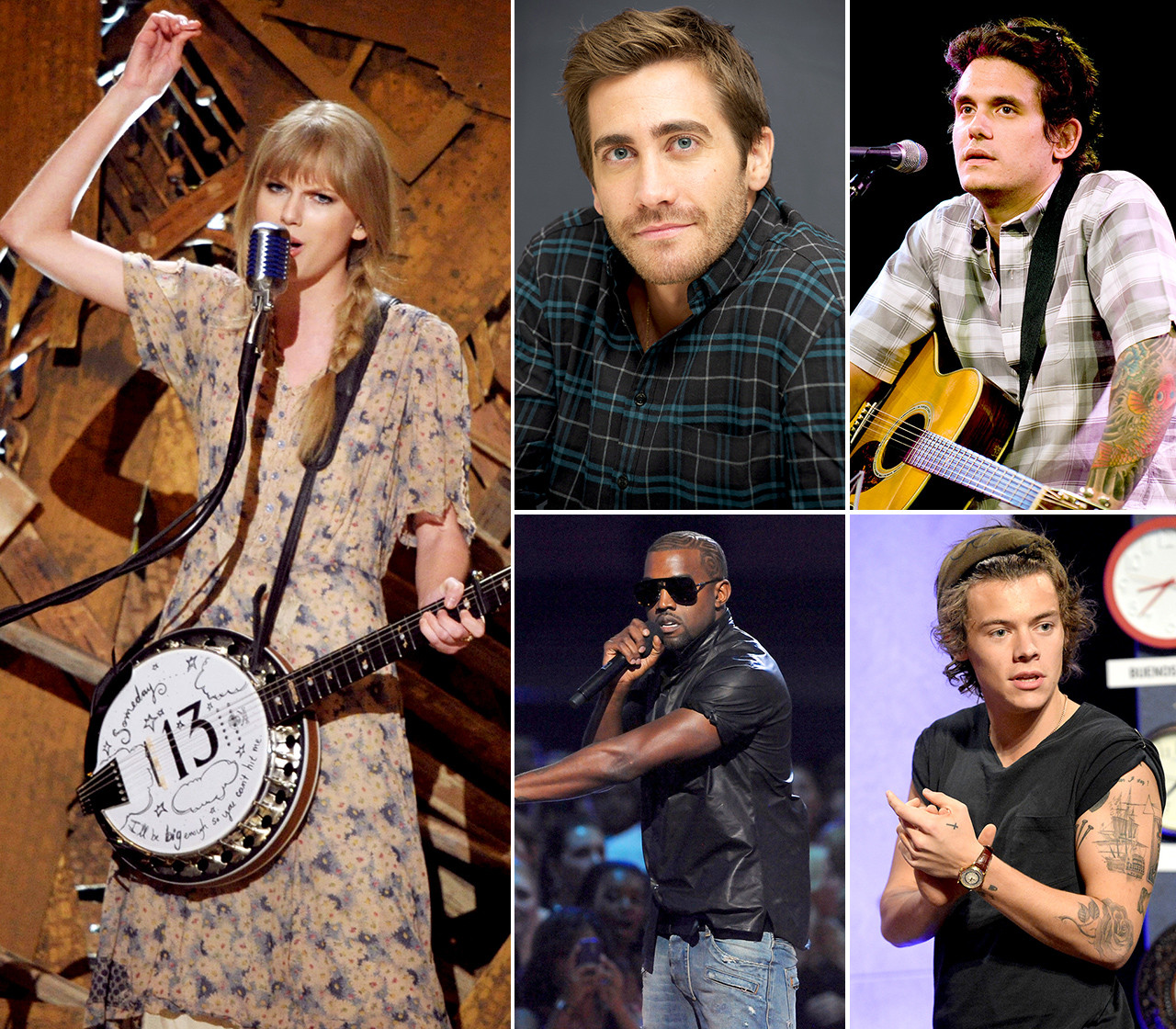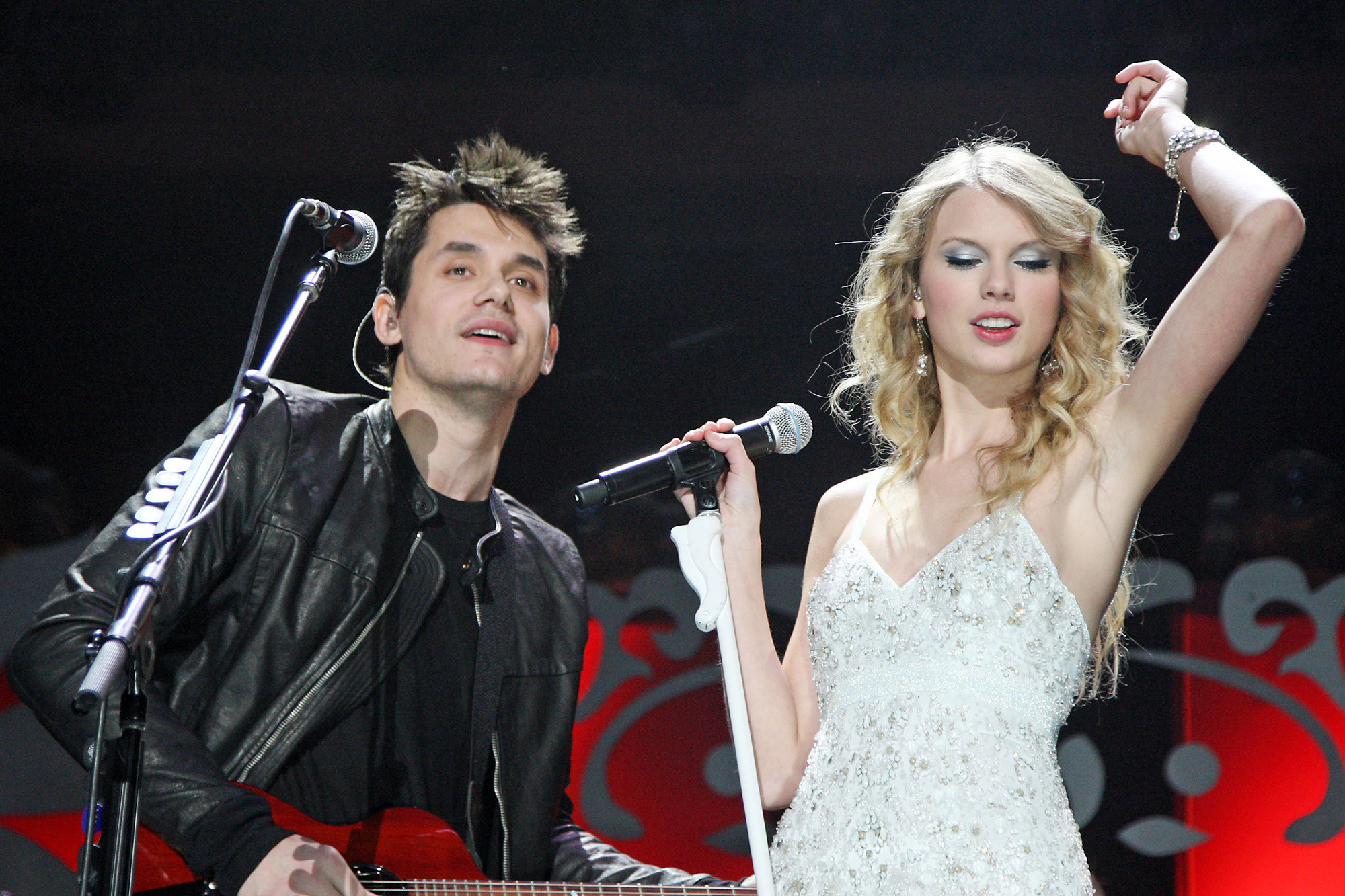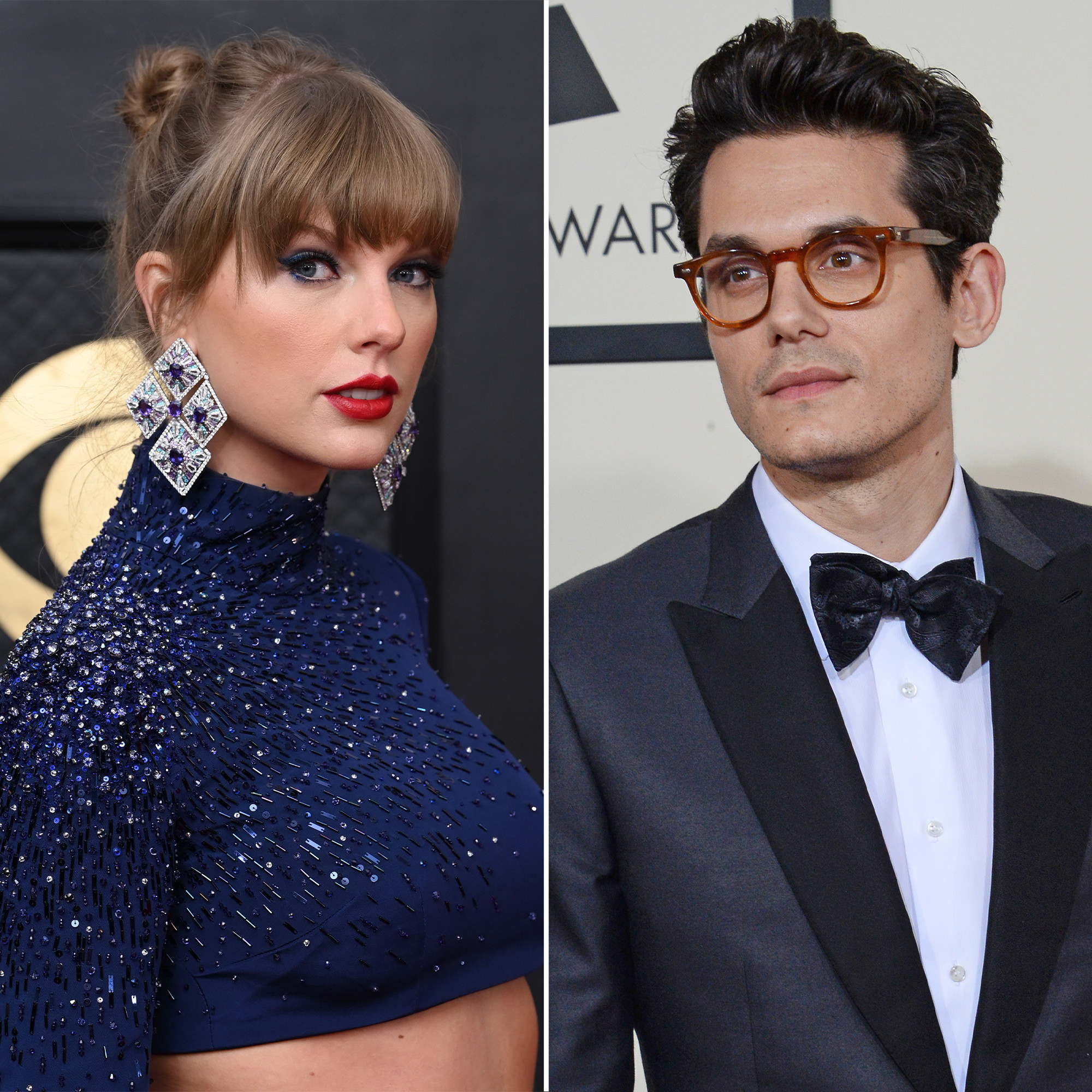What Taylor Swift Song Is About John Mayer? Several Taylor Swift songs are rumored to be about her relationship with John Mayer, with “Dear John” being the most explicitly linked. If you’re eager to explore the lyrical connections and uncover the stories behind these tracks, payoffsong.com is your ultimate guide. We’ll not only delve into the details of each song, but also show you how to leverage your own musical stories for success, potentially turning heartbreak into a hit. Discover the power of songwriting and music monetization today, with insights into royalties, licensing, and how to make your music resonate.
1. The Alleged Taylor Swift-John Mayer Saga: Unpacking the Lyrical Clues
Taylor Swift’s songwriting often blurs the line between personal experience and artistic expression, inviting fans to speculate about the real-life inspirations behind her hits. In July 2023, Taylor Swift encouraged her fans to be kind when Speak Now (Taylor’s Version) was released before performing “Dear John.” Several tracks are believed to be about her relationship with John Mayer. Let’s explore these alleged connections, examining the lyrics and context that fuel the rumors.
1.1. “Dear John”: The Anthem of Age Gap Discontent
Without a doubt, “Dear John,” from the Speak Now album, is the most direct and widely recognized song believed to be about John Mayer. The song’s title itself is a clear nod, and the lyrics delve into the pain and confusion of a young woman involved with an older, more experienced man.
1.1.1. Key Lyrics and Interpretations
- “Dear John, I see it all now, it was wrong / Don’t you think 19’s too young to be played by your dark, twisted games when I loved you so? / I should’ve known.”
- These lyrics directly address the age gap and the perceived manipulation within the relationship. The reference to being “played” suggests a power imbalance.
- “You paint me a blue sky and go back and turn it to rain.”
- This line implies that Mayer initially presented a positive facade but later caused emotional distress.
- “And you’ll add my name to your long list of traitors who don’t understand / And I’ll look back and regret how I ignored when they said ‘run as fast as you can.'”
- Here, Swift expresses regret for ignoring warnings from others and suggests that Mayer has a pattern of problematic relationships.
1.1.2. Mayer’s Reaction and Public Perception
John Mayer himself has acknowledged the song, stating in a 2012 interview with Rolling Stone that it “humiliated him” and made him “feel terrible.” He felt that he didn’t deserve the song’s harsh portrayal. This public reaction further solidified the song’s association with their relationship in the eyes of the public.
1.2. “The Story of Us”: The Awkward Encounter
“The Story of Us,” also from Speak Now, is rumored to be about an awkward encounter with Mayer at the 2010 CMT Awards following their breakup.
1.2.1. Lyrical Analysis
- “Now I’m standing alone in a crowded room and we’re not speaking / And I’m dying to know, is it killing you like it’s killing me yeah.”
- These lyrics capture the tension and discomfort of being in close proximity to an ex-lover without being able to communicate.
- “I liked it better when you were on my side.”
- This line suggests a longing for the past when they were still a couple.
- “This is a contest of who can act like they care less.”
- Expressing the emotional game that they both are playing
1.3. “Ours”: A Glimmer of Hope Amidst the Controversy?
“Ours,” another track from Speak Now, presents a more positive outlook on the relationship, focusing on a couple who defies external criticism and judgment. While not explicitly confirmed as being about Mayer, some lyrics hint at the possibility.
1.3.1. Deciphering the Lyrics
- “‘Cause I love the gap between the teeth.”
- Mayer famously has a noticeable gap between his two bottom front teeth.
- The lyrics also mention that the guy in the song has tattoos. Mayer has a sleeve of tattoos on his left arm.
- These details, while not definitive, add fuel to the speculation that “Ours” could be partially inspired by their relationship.
1.4. “Superman”: The Idolized Figure with a Flawed Reputation
The Speak Now deluxe edition track “Superman” portrays a romantic interest as a larger-than-life figure with a complicated public image.
1.4.1. Exploring the Connection
- “Tall, dark and beautiful.”
- This line is believed to be a description of Mayer’s appearance.
- “He’s not all bad like his reputation.”
- In 2010, the year Speak Now was released, Mayer faced significant criticism for using the N-word and making misogynistic comments in interviews. This lyric could be interpreted as a direct reference to that controversy.
 Taylor Swift’s Song Lyrics Decoded: Celebs Featured in Her Songs
Taylor Swift’s Song Lyrics Decoded: Celebs Featured in Her Songs
1.5. “I Knew You Were Trouble”: Recognizing the Red Flags
While Swift has never explicitly stated that “I Knew You Were Trouble” from the Red album is about Mayer, she has described the song as being about a relationship where she ignored obvious warning signs.
1.5.1. The Lyrics Speak Volumes
- The song’s chorus revolves around the realization that she knew someone was trouble from the start but pursued the relationship anyway.
- This theme aligns with the narrative of “Dear John,” where Swift expresses regret for ignoring warnings from others.
1.6. “Would’ve, Could’ve, Should’ve”: Regret and Lost Innocence
Released over a decade after Speak Now, “Would’ve, Could’ve, Should’ve” from the Midnights album is one of Swift’s most scathing and regretful songs. The lyrics strongly suggest a connection to her relationship with Mayer.
1.6.1. The Most Damning Evidence
- “And I damn sure would’ve never danced with the devil / At 19, and the God’s honest truth is that the pain was heaven / And now that I’m grown, I’m scared of ghosts.”
- This lyric directly references her age during the relationship and uses the metaphor of “dancing with the devil” to describe the experience.
- “Give me back my girlhood, it was mine first.”
- This line expresses a deep sense of loss and a desire to reclaim her innocence.
- “If clarity’s in death, then why won’t this die? / Years of tearing down our banners, you and I / Living for the thrill of hitting you where it hurts.”
- She is expressing anger about how she was treated by the person and how they intentionally want to hurt each other
- The song repeatedly states that the relationship is something she regrets “all the time.”
1.7. “Foolish One”: Longing and Denial
“Foolish One,” a vault track released on Speak Now (Taylor’s Version), offers further insight into Swift’s emotions following the breakup with Mayer.
1.7.1. The Heartbreak Unveiled
- “Stop checkin’ your mailbox for confessions of love / That ain’t never gonna come.”
- These lyrics reveal her longing for Mayer to express remorse and attempt reconciliation.
- “You will take the long way, you will take the long way down.”
- This line suggests that she anticipates a difficult and painful journey of moving on.
1.8. “The Manuscript”: A Retrospective Look with Lingering Scars
“The Manuscript,” the closing track on the bonus version of The Tortured Poets Department: The Anthology, contains several lyrical references that fans believe connect to her relationship with Mayer.
1.8.1. Echoes of the Past
- “In the age of him, she wished she was 30 / And made coffee every morning in a French press / Afterwards she only ate kids’ cereal / And couldn’t sleep unless it was in her mother’s bed.”
- These lyrics paint a picture of a young woman trying to navigate a relationship with an older man, highlighting the immaturity and vulnerability she felt.
- “She thought about how he said she was so wise beyond her years / Everything had been above board / She wasn’t sure.”
- Swift questioning her level of maturity in the past
1.8.2. Tying it All Together
- Swift appears to connect “The Manuscript” to “The Story of Us,” teasing that the song’s titular document could be about the story from the Speak Now track.
- “Now and then I reread the manuscript / But the story isn’t mine anymore.”
- This line suggests that while the experience still resonates with her, she has moved on and no longer identifies with the story.
 Every Song Taylor Swift Has Supposedly Written About Ex John Mayer
Every Song Taylor Swift Has Supposedly Written About Ex John Mayer
2. The Art of Songwriting: Turning Personal Experiences into Universal Hits
Taylor Swift’s success lies in her ability to transform personal experiences into relatable and emotionally resonant songs. Let’s explore the key elements of her songwriting approach and how you can apply them to your own music.
2.1. Authenticity and Vulnerability: The Key to Connection
Swift’s lyrics are often praised for their honesty and vulnerability. She doesn’t shy away from expressing raw emotions, even if they are unflattering or uncomfortable.
2.1.1. Tips for Writing Authentically
- Draw from your own experiences: Write about what you know and what you feel. Don’t try to be someone you’re not.
- Be specific: Use vivid details to bring your stories to life.
- Don’t be afraid to be vulnerable: Share your fears, insecurities, and regrets.
2.2. Storytelling: Creating a Narrative
Many of Swift’s songs tell a story, with a clear beginning, middle, and end. This narrative structure helps to engage listeners and draw them into the song’s world.
2.2.1. How to Craft a Compelling Narrative
- Start with a strong hook: Grab the listener’s attention from the first line.
- Develop your characters: Give your characters depth and complexity.
- Build tension: Create conflict and suspense to keep the listener engaged.
- Provide a resolution: Offer a sense of closure or catharsis.
2.3. Relatability: Finding the Universal in the Personal
While Swift’s songs are often about her own life, they resonate with a wide audience because they tap into universal themes and emotions.
2.3.1. Connecting with Listeners
- Focus on emotions: Explore common emotions like love, loss, joy, and anger.
- Use simple language: Avoid jargon and complex metaphors.
- Write about experiences that many people can relate to: Relationships, heartbreak, growing up, etc.
3. Monetizing Your Music: Turning Your Songs into a Payoff
Writing great songs is only half the battle. To truly succeed as a musician, you need to understand how to monetize your music and generate income from your creative work. That is where payoffsong.com comes in.
3.1. Understanding Music Licensing
Music licensing is the process of obtaining permission to use copyrighted music in various ways, such as in films, TV shows, commercials, video games, and more.
3.1.1. Types of Music Licenses
- Synchronization License: Grants the right to synchronize a song with visual media.
- Mechanical License: Grants the right to reproduce and distribute a song in physical or digital formats.
- Public Performance License: Grants the right to publicly perform a song, such as in a concert or on the radio.
- Master Use License: Grants the right to use a specific recording of a song.
3.1.2. Navigating the Licensing Process
- Identify the copyright holder: This is typically the songwriter or the music publisher.
- Contact the copyright holder: Obtain permission to use the song and negotiate the terms of the license.
- Pay the licensing fee: The fee will vary depending on the usage and the popularity of the song.
- Obtain a written agreement: Make sure the terms of the license are clearly outlined in a written agreement.
3.2. Royalties: Earning from Your Music
Royalties are payments made to songwriters and publishers for the use of their music.
3.2.1. Types of Royalties
- Performance Royalties: Generated when a song is performed publicly, such as on the radio, in a concert, or in a restaurant.
- Mechanical Royalties: Generated when a song is reproduced and distributed, such as on CDs, vinyl records, or digital downloads.
- Synchronization Royalties: Generated when a song is synchronized with visual media.
- Print Royalties: Generated when a song is printed in sheet music or other formats.
3.2.2. Collecting Your Royalties
- Join a Performing Rights Organization (PRO): PROs like ASCAP, BMI, and SESAC collect performance royalties on behalf of songwriters and publishers.
- Register your songs with your PRO: This ensures that you receive credit and payment for your songs.
- Track your song’s usage: Monitor where your songs are being performed and used.
- Submit cue sheets: If your songs are used in films or TV shows, submit cue sheets to the PROs to ensure that you receive synchronization royalties.
3.3. Exploring Other Revenue Streams
In addition to licensing and royalties, there are many other ways to monetize your music.
3.3.1. Additional Opportunities
- Selling music online: Sell your songs on platforms like iTunes, Amazon Music, and Bandcamp.
- Streaming: Earn royalties from streaming services like Spotify, Apple Music, and Deezer.
- Live performances: Perform your songs at concerts, festivals, and other events.
- Merchandise: Sell merchandise like t-shirts, posters, and CDs.
- Crowdfunding: Raise money to fund your music projects through platforms like Kickstarter and Patreon.
- Teaching: Offer music lessons to students of all ages and skill levels.
- Songwriting for others: Write songs for other artists or for commercial purposes.
- Brand Partnerships: Collaborating with brands for promotions and endorsements
 Every Song Taylor Swift Has Supposedly Written About Ex John Mayer
Every Song Taylor Swift Has Supposedly Written About Ex John Mayer
4. Case Studies: Songs That Turned Heartbreak into Gold
Taylor Swift isn’t the only artist who has successfully turned personal experiences into commercially successful songs. Let’s look at a few other examples.
4.1. Alanis Morissette – “You Oughta Know”
This angry breakup anthem, rumored to be about actor Dave Coulier, became a massive hit for Alanis Morissette in the mid-1990s. Its raw emotion and unflinching lyrics resonated with listeners who had experienced similar heartbreak.
4.2. Adele – “Someone Like You”
Adele’s “Someone Like You” is a ballad about heartbreak and acceptance. Its simple piano arrangement and powerful vocals made it a global phenomenon, connecting with listeners on a deeply emotional level.
4.3. Beyoncé – “Irreplaceable”
Beyoncé’s “Irreplaceable” is a song about female empowerment and moving on from a cheating partner. Its catchy melody and confident lyrics made it a massive hit, particularly among women.
5. Optimizing Your Music for Commercial Success
While artistic expression is paramount, understanding the commercial aspects of music can significantly increase your chances of success.
5.1. Understanding Market Trends
Staying informed about current music trends can help you create songs that resonate with a wider audience.
5.1.1. Researching Popular Genres
- Analyze Billboard charts: Keep track of the top songs in various genres.
- Follow music blogs and websites: Stay updated on new releases and emerging trends.
- Attend music industry events: Network with other musicians and industry professionals.
- Use Social Media Analytics: Understanding what is trending on social media
5.2. Collaborating with Other Professionals
Collaborating with other musicians, producers, and songwriters can bring fresh perspectives and expertise to your music.
5.2.1. Building Your Network
- Attend open mics and jam sessions: Meet other musicians and potential collaborators.
- Join online music communities: Connect with musicians from around the world.
- Reach out to producers and songwriters: Don’t be afraid to approach people whose work you admire.
- Go to local shows: Networking with local performers and other members of the community
5.3. Creating a Strong Online Presence
In today’s digital age, having a strong online presence is essential for reaching a wider audience and promoting your music.
5.3.1. Essential Steps
- Create a professional website: Showcase your music, biography, and upcoming events.
- Build a social media presence: Engage with fans on platforms like Facebook, Instagram, Twitter, and TikTok.
- Create high-quality content: Share music videos, live performances, and behind-the-scenes footage.
- Engage with your fans: Respond to comments, answer questions, and build relationships.
- Use Email Marketing: Creating email list to communicate directly with fans.
6. Legal Considerations: Protecting Your Music
Protecting your music is crucial to ensuring that you receive credit and compensation for your work.
6.1. Copyright Law
Copyright law protects your original musical works from unauthorized use.
6.1.1. Key Aspects
- Copyright protects your music as soon as it is fixed in a tangible form, such as a recording or sheet music.
- You don’t need to register your copyright to have protection, but registration provides additional legal benefits.
- Copyright gives you the exclusive right to reproduce, distribute, perform, and display your music.
6.2. Publishing Agreements
A publishing agreement is a contract between a songwriter and a music publisher that grants the publisher certain rights to the songwriter’s music.
6.2.1. Understanding the Terms
- Rights granted: The agreement will specify which rights the publisher has, such as the right to license the music, collect royalties, and promote the music.
- Term: The agreement will specify the length of time that the publisher has these rights.
- Royalties: The agreement will specify how royalties will be split between the songwriter and the publisher.
- Advances: The agreement may provide for an advance payment to the songwriter.
6.3. Trademark Law
Trademark law protects your brand name and logo from being used by others.
6.3.1. Protecting Your Brand
- Register your band name and logo with the U.S. Patent and Trademark Office.
- Use your trademark consistently in your marketing materials.
- Monitor for unauthorized use of your trademark.
 THE GYM PEOPLE Womens
THE GYM PEOPLE Womens
7. Resources for Musicians: Where to Find Help and Support
Navigating the music industry can be challenging, but there are many resources available to help musicians succeed.
7.1. Organizations
- The American Society of Composers, Authors and Publishers (ASCAP): A performing rights organization that collects performance royalties for its members.
- Broadcast Music, Inc. (BMI): Another performing rights organization that collects performance royalties for its members.
- The Songwriters Guild of America (SGA): An organization that advocates for the rights of songwriters.
- The Recording Academy: An organization that presents the Grammy Awards.
7.2. Online Platforms
- Bandzoogle: A website builder specifically for musicians.
- SoundCloud: A platform for sharing and discovering music.
- YouTube: A platform for sharing music videos and live performances.
- Spotify: A streaming service that pays royalties to artists.
7.3. Educational Resources
- Berklee College of Music: A renowned music school offering online and on-campus programs.
- Coursera: An online learning platform offering courses on music theory, songwriting, and music business.
- MasterClass: An online learning platform offering courses taught by renowned musicians.
8. The Future of Music Monetization: Emerging Trends
The music industry is constantly evolving, and new opportunities for monetization are emerging all the time.
8.1. NFTs (Non-Fungible Tokens)
NFTs are unique digital assets that can be used to represent ownership of music, art, and other collectibles.
8.1.1. Opportunities
- Selling exclusive music: Artists can sell exclusive songs or albums as NFTs.
- Creating digital collectibles: Artists can create digital collectibles, such as artwork or memorabilia, and sell them as NFTs.
- Engaging with fans: Artists can use NFTs to reward loyal fans and create exclusive experiences.
8.2. Metaverse Concerts
The metaverse is a virtual world where people can interact with each other and with digital objects.
8.2.1. Opportunities
- Performing virtual concerts: Artists can perform concerts in the metaverse, reaching a global audience.
- Selling virtual merchandise: Artists can sell virtual merchandise, such as clothing and accessories, to fans in the metaverse.
- Creating immersive experiences: Artists can create immersive experiences for fans in the metaverse, such as virtual meet-and-greets and backstage tours.
8.3. Artificial Intelligence (AI)
AI is being used to create new music, generate lyrics, and personalize the listening experience.
8.3.1. Benefits
- AI-powered songwriting tools: AI can help songwriters overcome writer’s block and generate new ideas.
- AI-generated music: AI can create original music in a variety of styles.
- Personalized music recommendations: AI can recommend music that listeners are likely to enjoy.
9. Addressing the Challenges: Overcoming Obstacles in the Music Industry
While the music industry offers many opportunities, it also presents numerous challenges.
9.1. Competition
The music industry is highly competitive, with countless artists vying for attention.
9.1.1. How to Stand Out
- Develop a unique sound: Find your own voice and create music that is different from what everyone else is doing.
- Create high-quality recordings: Invest in professional recording equipment or hire a professional recording engineer.
- Build a strong online presence: Promote your music online and engage with fans.
- Network with industry professionals: Attend music industry events and connect with other musicians, producers, and label executives.
9.2. Financial Instability
Making a living as a musician can be difficult, especially in the early stages of your career.
9.2.1. Strategies
- Diversify your income streams: Don’t rely solely on music sales or streaming royalties.
- Create a budget: Track your income and expenses to ensure that you are living within your means.
- Seek financial assistance: Apply for grants and funding opportunities.
- Find a side hustle: Consider working a part-time job to supplement your income.
9.3. Burnout
The demands of the music industry can lead to burnout, both physically and emotionally.
9.3.1. Tips
- Take breaks: Schedule regular breaks to relax and recharge.
- Set realistic goals: Don’t try to do too much too soon.
- Seek support: Talk to friends, family, or a therapist about your struggles.
- Prioritize your mental and physical health: Make sure you are getting enough sleep, eating healthy, and exercising regularly.
10. FAQ: Unlocking the Secrets of Music Monetization
Let’s address some frequently asked questions about music monetization.
10.1. How do I copyright my music?
You automatically have copyright protection as soon as your music is fixed in a tangible form, but registering your copyright with the U.S. Copyright Office provides additional legal benefits.
10.2. What is a music publisher?
A music publisher is a company that helps songwriters manage their copyrights, collect royalties, and promote their music.
10.3. How do I join a performing rights organization?
You can join ASCAP, BMI, or SESAC by visiting their websites and filling out an application.
10.4. How do I get my music on Spotify?
You can get your music on Spotify by using a music distributor like DistroKid, TuneCore, or CD Baby.
10.5. How much do musicians make from streaming?
The amount that musicians make from streaming varies depending on the platform and the number of streams, but it is generally a small amount per stream.
10.6. How do I get my music licensed for film or TV?
You can get your music licensed for film or TV by contacting music supervisors or licensing agencies.
10.7. What is a music supervisor?
A music supervisor is a person who selects and licenses music for films, TV shows, and commercials.
10.8. How do I find a music lawyer?
You can find a music lawyer by searching online directories or by asking for referrals from other musicians.
10.9. What is a 360 deal?
A 360 deal is a contract between an artist and a record label that gives the label a percentage of the artist’s income from all sources, including music sales, touring, merchandise, and endorsements.
10.10. How do I protect myself from scams in the music industry?
Be wary of anyone who promises you instant success or asks you to pay them money upfront. Do your research and get everything in writing before signing any contracts.
As you navigate the world of music and songwriting, remember that every song has the potential to be a success story. Whether you’re pouring your heart into a ballad or crafting a catchy pop tune, payoffsong.com is here to guide you. From understanding music licensing to maximizing your royalty income, we offer the insights and tools you need to turn your passion into a profitable career. Visit payoffsong.com today and unlock the potential of your music!
Address: 1601 Vine St, Los Angeles, CA 90028, United States.
Phone: +1 (323) 469-2211.
Website: payoffsong.com.
Watch ‘Real Housewives’ Kids Take Over New York in ‘Next Gen NYC’ Trailer

